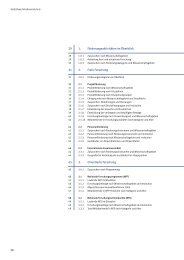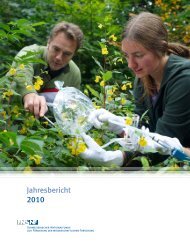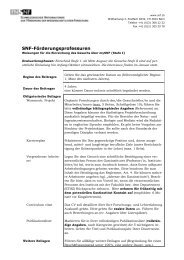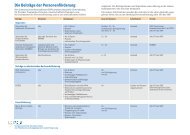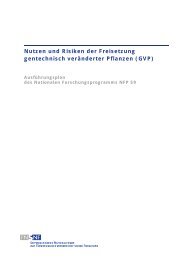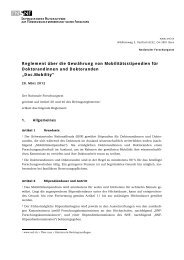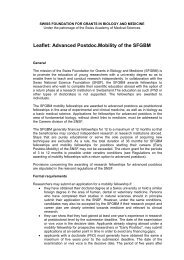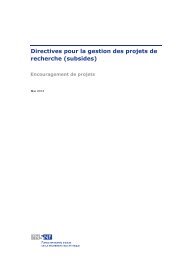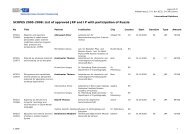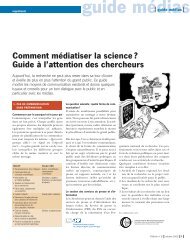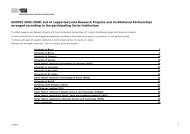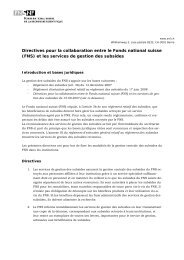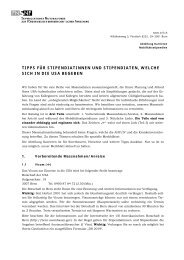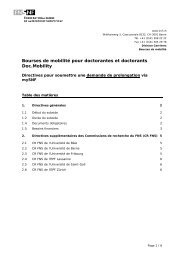NCCR Guide 2013 - Schweizerischer Nationalfonds (SNF)
NCCR Guide 2013 - Schweizerischer Nationalfonds (SNF)
NCCR Guide 2013 - Schweizerischer Nationalfonds (SNF)
Create successful ePaper yourself
Turn your PDF publications into a flip-book with our unique Google optimized e-Paper software.
Challenges to Democracy<br />
in the 21 st Century<br />
<strong>NCCR</strong> Democracy<br />
• Institute of Communication<br />
Studies, Leeds University, GB<br />
• Institute of Mass Communication<br />
and Media Research,<br />
Free University Berlin, DE<br />
• Institute of Political Science,<br />
University of Munich, DE<br />
• Laboratoire Communication et<br />
politique, Centre National de la<br />
Recherche Scientifique, Paris, FR<br />
• Political Science Department,<br />
University of Mannheim, DE<br />
• Political Science Department,<br />
University of Oslo, NO<br />
• Politics and International Studies,<br />
Open University, Milton Keynes, GB<br />
• Professorship Theory and History<br />
of Democracy, Social Science<br />
Research Center Berlin, DE<br />
• School of Politics and<br />
International Relations,<br />
University College Dublin, IE<br />
• Social Science Research Institute,<br />
Abo Akademi, Turku, FI<br />
• Vakgroep Politieke<br />
Wetenschappen, Vrije Universiteit<br />
Brussels, BE<br />
• Zentrum für Sozialpolitik,<br />
Universität Bremen, DE<br />
Economy / Industry<br />
• Bertelsmann Transformation<br />
Index, Bertelsmann Stiftung,<br />
Gütersloh, DE<br />
• Politools, Bern, CH<br />
Others<br />
• Schweizer Jugend forscht,<br />
Bern, CH<br />
• Tripartite Agglomerationskonferenz<br />
/ Konferenz der Kantonsregierungen,<br />
Berne, CH<br />
Achievements of the previous years<br />
Multi-disciplinary research<br />
The 24 research projects<br />
completed in Phase I show<br />
how the two challenges of<br />
globalization and mediatization<br />
jeopardize or reinforce<br />
democracy: While<br />
globalization poses new<br />
threats to democracy at<br />
the national level, it also<br />
allows for the democratization<br />
of supranational<br />
organizations and of nondemocratic<br />
countries.<br />
However, the projects also<br />
indicate the unfavourable<br />
consequences of democratization.<br />
While mediatization<br />
leads to a commercialization<br />
of news and extends<br />
the techniques of manipulating<br />
public opinion, it<br />
also diversifies the sources<br />
of news reporting, opens<br />
politics to the scrutiny of<br />
an ever more sophisticated<br />
public, and increases the<br />
focus on dialogue. The research<br />
results have been<br />
or are in the process of<br />
being published with leading<br />
publishers and in major<br />
journals in the fields. Furthermore,<br />
the <strong>NCCR</strong> has<br />
launched a refereed e-<br />
journal Living Reviews on<br />
Democracy, providing upto-date<br />
reviews of the state<br />
of research in all fields of<br />
democracy studies.<br />
Knowledge transfer<br />
The projects in the Module<br />
“The quality of democracy”<br />
and the Knowledge Transfer<br />
Projects have provided<br />
tools either for democracy<br />
research or for the transfer<br />
of research results to<br />
the public: The Democracy<br />
Barometer has completed<br />
data collection for<br />
75 democracies; the publicly<br />
accessible website<br />
www.democracybarometer.org<br />
presents country rankings<br />
and diagrams allowing for<br />
an assessment of the quality<br />
of democracy in established<br />
democracies. Two projects<br />
have produced e-learning<br />
tools in order to support<br />
courses in Swiss secondary<br />
schools or at Swiss universities.<br />
One project developed<br />
an instrument to monitor<br />
mass media performance<br />
in modern democracies.<br />
Another project developed<br />
decision-aids for voters in<br />
the domain of e-democracy<br />
and identified the risks and<br />
potentials of such tools<br />
from a legal perspective.<br />
Finally, one project promoted<br />
knowledge transfer<br />
of <strong>NCCR</strong> research into<br />
society by mediating joint<br />
meetings with researchers<br />
and journalists.<br />
Education and training<br />
The <strong>NCCR</strong> Democracy<br />
provides an interdisciplinary<br />
doctoral program in<br />
order to enable its participants<br />
to obtain Ph.D. degrees<br />
of such a quality that<br />
they can place themselves<br />
at the forefront of their<br />
discipline(s) in Switzerland<br />
or abroad. The <strong>NCCR</strong><br />
supports the training of 26<br />
Ph.D. students in each research<br />
phase. The completion<br />
rate and professional<br />
perspectives of the students<br />
are very positive: Most of<br />
them completed their Ph.D.<br />
in time and continued their<br />
academic career. In Phase<br />
II, another focus is on promoting<br />
postdoctoral researchers.<br />
Furthermore,<br />
an <strong>NCCR</strong> assistant professorship<br />
in democratization<br />
was created in 2010 at the<br />
University of Zurich.<br />
The core of our efforts<br />
to promote female researchers<br />
is the peer mentoring<br />
program. Two peer<br />
groups have been established<br />
in order to advance<br />
the careers of their members<br />
in academia and beyond.<br />
The groups organize<br />
a variety of successful<br />
activities designed to develop<br />
skills vital to building<br />
up successful careers and<br />
to create networks. Most<br />
female doctoral students<br />
plan to stay in academia<br />
after finishing their dissertation.<br />
The program has<br />
been a very positive experience<br />
for all of its members,<br />
and they consider it<br />
one of the most effective<br />
forms of supporting the<br />
advancement of women<br />
in academia.<br />
Structural effects<br />
The <strong>NCCR</strong> Democracy<br />
initiated the Zentrum für<br />
Demokratie Aarau (ZDA).<br />
The ZDA is the first democracy<br />
research center in<br />
Switzerland and a unique<br />
model for a partnership between<br />
a municipality (City<br />
of Aarau), a canton (Argovia),<br />
a university of applied<br />
sciences (FHNW) and a university<br />
(University of Zurich).<br />
The establishment of<br />
the center has also led to the<br />
creation of a new professorship<br />
in Democracy Studies<br />
at the University of Zurich.<br />
The founding of ZDA is an<br />
important measure for institutionalizing<br />
the <strong>NCCR</strong><br />
Democracy and for securing<br />
and extending its<br />
research and educational<br />
efforts in the long run.<br />
Further information see<br />
www.nccr-democracy.uzh.ch<br />
Partner Institutions<br />
European University Institute (EUI), Florence<br />
FORS, Université de Lausanne<br />
Social Science Research Center Berlin (WZB), Berlin<br />
Zentrum für Demokratie (ZDA), Aarau<br />
94 | <strong>Guide</strong> <strong>2013</strong>



